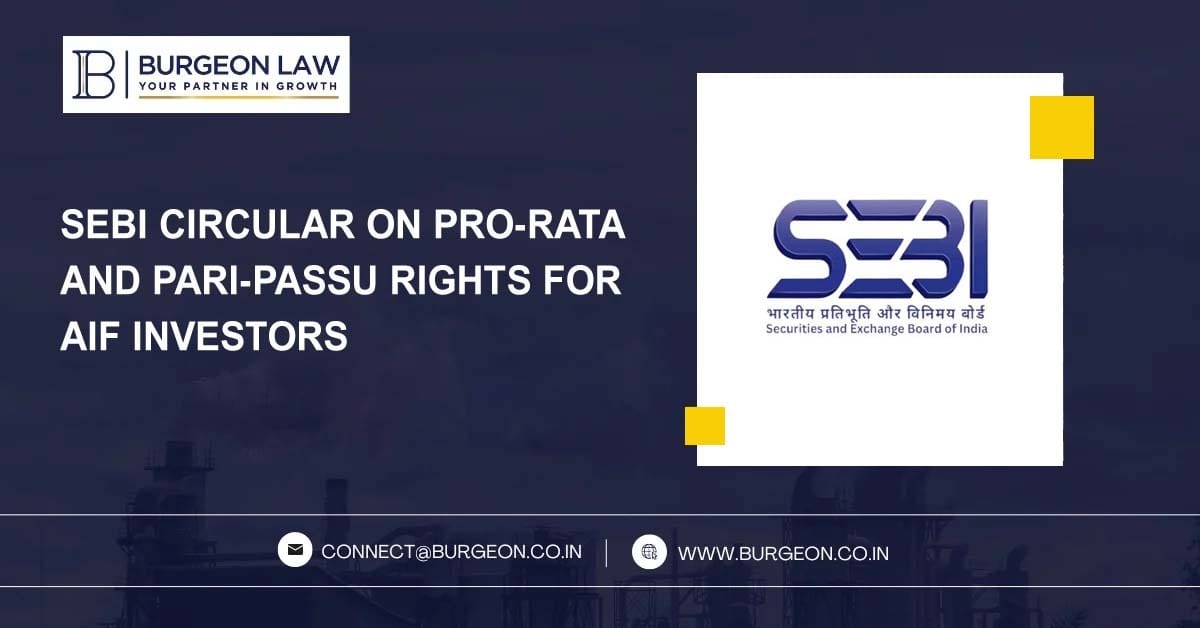On December 13, 2024, the Securities and Exchange Board of India (“SEBI”) issued a pivotal circular that redefines the norms around pro-rata and pari-passu rights for investors in Alternative Investment Funds (“AIFs”). This follows SEBI’s earlier regulatory initiatives issued on November 18, 2024, which laid the groundwork for uniformity and investor-centric reforms across India’s alternative investment landscape. Together, these regulations aim to standardize fund structures, enhance investor protections, and improve governance across the sector.
Table of Contents
ToggleUnderstanding Pro-Rata and Pari-Passu Rights
In the context of AIFs, pro-rata rights dictate that investors receive benefits, rights, and entitlements in proportion to their investment commitments. This principle safeguards investor equity by ensuring that returns and distributions are aligned with each investor’s share in the fund.
On the other hand, pari-passu rights imply that all investors in a particular class are treated equally. Pari-passu ensures uniformity in rights, distributions, and benefits, preventing preferential treatment to select investors. Together, pro-rata and pari-passu rights create a fair and transparent framework for capital allocation, enabling greater trust between fund managers and investors.
Key Provisions of the SEBI Circular
SEBI’s circular introduces multiple clarifications and exceptions to ensure an equitable and well-regulated AIF structure:
1. Exceptions to Pro-Rata Rights
The SEBI circular recognizes that certain circumstances necessitate deviations from the pro-rata mandate that the investor’s right should always be pro-rata to such investor’s commitment:
- Excused or Excluded Investors: Investors who are excused or excluded from participating in specific investments due to legal, regulatory, or contractual constraints will not be entitled to pro-rata distributions for those investments.
- Defaulting Investors: Investors who fail to honor their capital commitment obligations will forfeit their pro-rata rights. This creates accountability, ensuring fund liquidity and minimizing disruption caused by defaults.
- Carried Interest or Profit Sharing: Pro-rata principles do not apply to distributions made toward carried interest payable to fund managers or sponsors, as these are based on performance thresholds rather than contributions.
2. Subordinate Units
One of the major takeaways from the SEBI circular is the introduction of subordinate units, which permits the investment manager or sponsor of the AIF, government-backed institutions, and development financial institutions, to accept lesser or share losses other in accordance with their pro-rata rights.
Furthermore, the circular has implemented stringent safeguards to prevent misuse of the subordinate unit framework by providing that in case the manager or sponsor of the AIF subscribes the subordinate units, then the funds raised via subordinate units cannot be used by the investee company to settle liabilities owed to sponsors, managers, or their associates. This provision prevents conflicts of interest and promotes responsible fund management.
3. Differential Rights
SEBI has finally formalized the offering of Differential Rights (“DRs”) in AIFs. These rights allow AIFs to provide additional terms and privileges to specific investors without impacting others in the same class. Some key principles guiding DRs are:
- No Cross-Liabilities: Investors holding DRs cannot be burdened with liabilities attributable to other investors.
- Participation Boundaries: DRs cannot grant undue voting or decision-making rights, except where explicitly defined within the fund’s Investment Committee.
- Full Disclosure: Eligibility criteria and terms of DRs must be transparently disclosed in the private placement memorandum.
Additionally, the standard setting forum for AIFs has been tasked with formulating guidelines on DR implementation by January 15, 2025. These guidelines will define permissible rights under DR frameworks and provide clarity for fund managers.
Impact on Stakeholders
For Investors
The circular is a positive step for investors, as it ensures that their rights and entitlements remain proportionate to their commitments. By safeguarding pro-rata principles and introducing exceptions with clear boundaries, SEBI fosters a fairer distribution structure.
Sophisticated and institutional investors also benefit from the new DR framework, allowing them to negotiate specific terms based on their risk-return expectations.
For Fund Managers and Sponsors
Fund managers now enjoy increased flexibility in structuring AIF schemes. The ability to issue subordinate units and offer DRs, may help fund managers attracting diverse investor segments, including development financial institutions and government-backed organizations.
For Existing AIF Schemes
SEBI has mandated that AIF schemes relying on priority distribution models that deviate from the circular’s principles must achieve compliance. Such funds will not be permitted to accept fresh commitments or deploy capital until alignment is achieved.
Conclusion
By reinforcing pro-rata and pari-passu norms, SEBI ensures fairness in capital distribution and equal treatment of investors with certain exception. At the same time, the flexibility provided through subordinate units and DRs reflects the regulator’s forward-thinking approach to accommodate the evolving needs of sophisticated investors and institutional participants.
These regulations represent a pivotal step toward balancing the often complex interplay between investor protection and fund manager flexibility. SEBI’s phased approach underscores a long-term vision to create a resilient and competitive alternative investment market capable of attracting both domestic and global capital.
The collective impact of these reforms will undoubtedly reinforce investor confidence, attract institutional participation, and elevate India’s standing as a global hub for alternative investments. Stakeholders must proactively adapt to these changes to stay ahead of the curve and capitalize on the immense potential that India’s AIF market offers.

